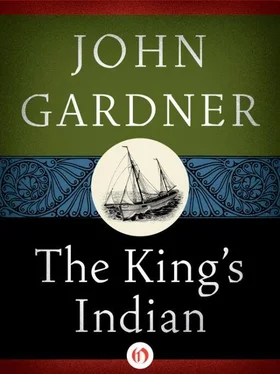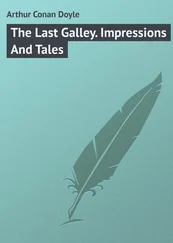“We rich as the Vatican yet?” I ask.
“Not yet.” Belatedly, he smiles. His eyes, behind the thick lenses, are like hens’ eggs.
I have in some way slightly annoyed him, made him lose his bearings. I don’t worry about it, though I keep it in the back of my mind as I take off my robe and hang it in the closet. It comes to me at last that he dislikes jokes about the Vatican. By prayerful meditation — that is, by turning it over and over in his mind until the idea has become no longer shocking — he has adjusted to the ecumenical movement. Now here I am, casting aspersions on another faith. I shake my head and smile, and, the same instant, I catch my reflection in the glass of the photograph of Lake Geneva. I’m startled, as usual, by the beard. I remember the strange young man at the door, how alarmed I was by his oddity, his offensive foreignness. So my flock must have felt when I returned from my summer of study in San Francisco. Poor Dr. Grewy, for instance; a man of routine; a conservative. (I watch him light his pipe, stretching his lips like an infant at the nipple.) Dr. Grewy was chiefly responsible for, as he calls it, our physical plant. That was in the time of my predecessor, a silver-haired solemn old man with a lisp, or a whistle, to be precise, a sort of birdcall on the s’S of Jesus. Dr. Grewy was hurt, “deeply wounded,” he said, when I first suggested, in some sermon or other, that the era of building in the forties and fifties was a theological error for which we must pay through the rest of the century. I gave him Kierkegaard’s Attack upon “Christendom,” and he not only read it but made it the subject of his men’s class discussions. I gave him Tillich, the letters of Bonhoeffer, and books on the work of inner-city churches. It gradually came clear in his mind that justice is more important than wine-red carpets in the lounge. Dr. Grewy was grieved, bewildered, obscurely ashamed of himself. He came to visit me one night at the manse. He stood in the twilight, two years ago exactly, clumsily buttoning and unbuttoning his suitcoat, looking vaguely around in his thick-lensed glasses at the porch balusters, the mat that says Hello! the stack of rotting wood for the fireplace, butt-ends from the Carbondale railroad-tie factory. I hardly knew him at the time — I’d been here in Carbondale less than a month — though I recognized him as one of my church officers. “Good evening,” I said, reaching out for his hand.
“Oh,” he said. “Oh yes! Oh.” He looked down at the wood. “I hadn’t realized,” he said, “that you weren’t unpacked yet. I was just—”
“Come in,” I said. “Do come in.”
The sunset was full of the smell of burning leaves.
“I’m Dr. Grewy,” he said.
“Yes of course. I recognized you. Deacon Grewy.” I smiled, squeezing his hand with my right hand, cupping his elbow with my left.
“I’m an Elder, actually.” He blushed. It meant much to him, I saw, this lofty position he was certain he didn’t deserve.
“Elder. Certainly! What a stupid mistake! — Come in, Dr. Grewy, come in!” I guided, or rather pulled him into the dingy front room and encouraged him out of his coat. When he was seated I offered him wine. He looked alarmed, then confused. “I’m a teetotaler,” he said. “Ah,” I said. “Then coffee.” “Yes, thank you.”
We talked half the night. His soul was in torment. How absurd that a man like Dr. Grewy could possess a tortured soul! But life scoffs, as we know, at dignity. Behold what happens to the tallest oaks, the noblest elms. In poems, tortured souls are found in towering, deep-brained men, men with dark eyebrows that flare out like wings and legs firm as pillars from walking high windy cliffs, bare heaths, forsaken shores. They suffer, they see the Truth, and they overcome. Who’d need salvation if life were art? Dr. Grewy, whose sad habitation was life, was miserable.
He was cross at first, as if it were my fault that the Presbyterian Church had betrayed him. I told him — firmly, though without any rancor — that he was behaving like a child. He complained then about my predecessor. I told him he had no one to blame but himself. For forty-some years he’d been listening to sermons about Christian love, but when bombs went off in Mississippi churches, Dr. Grewy was tallying builders’ accounts. He looked alarmed, wringing his fingers. I could not make out what made him stare at me. “Go ahead,” I said rather sternly. “What’s bothering you now? Come out with it!”
His lips were willing, but his voice was weak. On the third try he brought out, “Suppose — I lack — the intelligence to be a Christian?”
“Faddle!” I said. But I was sorry the next instant. He was dead serious, and the problem was real, and it had not been an easy thing for him to say. Medical doctors are intelligent by definition, yet here he was, baldly confessing … I was astonished. Intelligent or not, he was no ordinary man. His eyes swam in tears. I leaned toward him to touch his shoulder. It was a mistake. Or perhaps it was right, in the end. His arms jerked convulsively, and his tight face flew out of control, shattered into his hands, and he began to whoop, “God help me! God help me!” What was I to do? I jumped, exploded, up out of my chair — we were sitting more or less knee-to-knee — and reached down to hold him in my arms as I would a child, but I couldn’t, standing over him, so I merely patted both his shoulders awkwardly, as though I were myself another child.
“Lost!” he whooped. “Lost!”
“Nonsense,” I said gently. “Nobody’s lost.”
I tried to explain about Christian redemption. It all seemed extremely simple to me, but I’ve never been sure he got it. I tried to explain to him the Parable of the Talents. He sat listening carefully, looking bewildered. (He’d finished whooping now.) When I was sure I’d made everything clear as day, Dr. Grewy nodded slowly and thoughtfully, his many-times magnified eyes red and puffy, and he ran his hands back and forth on his legs, toward his knees, back again. “Welfare is ruining this country,” he said, and nodded.
“Ah well,” I said, “God loves us all. Probably.”
Dr. Grewy puts the collection money in bags, sucks at his pipe, puts down numbers in the ledger. He glances at me, his eyes moving like fish behind the lenses. “It’s none of my business,” he begins, then falters. I let him stew for a moment. At last, he says: “You should be careful what you say. Overthrowing governments and things, I mean. What if someone from the FBI …” He glances at the office door. Sylvester Jones will be out there somewhere, sweeping, picking up scraps of paper, his face black as coal, his hair snow-white, a man old enough to be father of us all. “These days, you know …” He looks startled, as if by an abdominal pain. “You hear the news this morning?”
I shake my head, watching him.
“Someone blew up the Art Building.” His face is as white as his soft, fat neck. His lips tremble. In a moment he’ll be in a fiery rage against Communist Anarchists, dope addicts, Panthers. Though I mock him, I’m slightly infected by his fear. Someone once threatened to burn down my house. The memory’s as much in my blood as in my mind: my sudden objectness, imprisonment inside the whim of some unknown madman. I shake it off quickly. The world may control me, accidents of time and space and temper, but I needn’t enchain myself with fearful fantasies.
“That’s terrible,” I say, and look at my watch. “But we’d better go, Dr. Grewy. Actually, I’m starving.”
He closes the ledger, stands up, puts his arms in the armholes of his suitcoat.
I lock the office and start with him to the back door. We look up at the centerpoint of the arch above us. Behind us the wall is blue and red and yellowish green with pale projections of images in the new stained glass. All this is the work of Dr. Grewy and his building fund. Though he believes now that adding on to the church was a mistake, he’s proud, in spite of himself, of the addition. It’s a beautiful structure, modern, full of light; yet it harmonizes with the older part. I can hardly ask him to be sorry, whatever the stern opinions of the prophet Amos. I can disapprove of his love of wealth (I’d be ashamed to live in a house like his — a driveway that curves in for half a mile past shrubbery and pools; two white new pillars on the porch, set much too far apart, like a farmer’s legs when he squats in the bushes to relieve himself), but I take men where I find them; they give me no choice. The church, they were sure, would grow larger and larger— even this new bank of sunday-school rooms would soon be totally inadequate. The rooms sit empty now, week after week, like the new wing the Methodist people put up, and like the Lutherans’ new building. The Baptists unloaded their monster to the university. But all that is not Dr. Grewy’s fault. He did what was asked of him, bowed down, humble and devoted, to the brass god Stewardship, and meant no harm. He donates time to the free health clinic; he cooperates, so far as his ethic allows, with the drug crisis center. He may not be exactly the salt of the earth, but he’s as good a man as he knows how to be.
Читать дальше











![John Bruce - The Lettsomian Lectures on Diseases and Disorders of the Heart and Arteries in Middle and Advanced Life [1900-1901]](/books/749387/john-bruce-the-lettsomian-lectures-on-diseases-and-disorders-of-the-heart-and-arteries-in-middle-and-advanced-life-1900-1901-thumb.webp)
